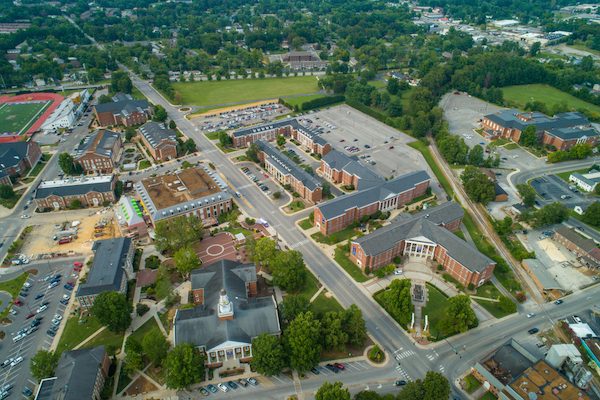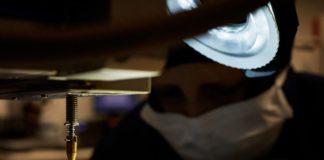
Spooky season came early last month for Tennessee Technological University President Phil Oldham, who claimed he was “disturbed” after watching a viral video clip of a student-run drag show at the university’s Backdoor Playhouse. He vowed to investigate the event’s student group sponsors, canceled all of the groups’ scheduled events until further notice, and (incorrectly) said campus events should not include “obscene, lewd, or explicit activities.”
But it’s been more than two months since the president issued this chilling edict, and the student groups — the Lambda Gay Straight Alliance and the Tech Players — are still not only subject to a mysterious investigation but also unable to host campus events. And they’ve been left uncertain about the future of their expressive rights at Tennessee Tech.
Admins clutch pearls over ‘DRAG at the Backdoor’
The show that had everyone talking — and Tennessee Tech administrators screaming for the censors — was an all ages community drag show, “DRAG at the Backdoor.”
The show featured costumed performers dancing and lip-syncing on the theater stage — in other words, engaging in expressive conduct that falls under traditionally protected genres: art, theater, and dancing. None of the performances, songs, dance routines, or activities depicted in the video or otherwise met the exacting legal standard for “obscenity,” a legal term of art describing “patently offensive hard core sexual conduct” lacking “serious literary, artistic, political, or scientific value.” DRAG at the Backdoor did not, in fact, even approach that high bar. Tennessee Tech thus had no excuse for meddling in students’ right to host, sponsor, or participate in such events — or for continuing to do so.
Whether the First Amendment protects expressive conduct does not depend on personal taste, moral sensibilities, administrative hand-wringing, or online mob rule. Student groups have the right to host events that some people, even the university president, might find offensive, explicit, or distasteful.
Instead of addressing the very real First Amendment concerns outlined in both of our letters, university counsel accused us of name-calling
On Sept. 15, FIRE sent President Oldham a letter calling on Tennessee Tech to immediately end its investigation into the student groups, reinstate the groups’ ability to host expressive events, and commit to upholding the university’s First Amendment obligations to protect free expression in the future.
Canceling the student groups’ scheduled events and banning them from hosting any future events pending administrative review and approval amounts to an unconstitutional prior restraint — meaning, in this case, that the university silenced students’ expressive events before they could even occur. Tennessee Tech has barred the groups from hosting any campus events since DRAG at the Backdoor, resulting in its cancellation of at least three scheduled events amid a seemingly never-ending investigation.
On Sept. 21, Tennessee Tech’s general counsel responded to FIRE to clarify that the investigation will most likely conclude DRAG at the Backdoor enjoyed First Amendment protection and result in reinstatement of the groups’ upcoming events. He even assured FIRE the university would announce as much a week or two from that date.
However, those two weeks came and went, and the student groups were still under investigation and prohibited from hosting events, so FIRE knocked louder on Tennessee Tech’s door. On Oct. 26, we sent a second letter demanding that Tennessee Tech administrators serve up some constitutional realness by immediately clearing the student groups of any wrongdoing and reinstating their First Amendment right to hold expressive events like drag shows.
There’s nothing for Tennessee Tech to investigate here, yet the university has been conducting a speech-chilling investigation and imposing an unconstitutional prior restraint on these groups for two months.
Tennessee Tech has yet to respond substantively to FIRE’s second letter, but after a few more calls and emails with university counsel, it is clear the school’s administrators are not happy we’re continuing to shine a spotlight on Tennessee Tech for improperly investigating and punishing the student groups. Instead of addressing the very real First Amendment concerns outlined in both of our letters, university counsel accused us of name-calling and aggressively stating “untrue assertions” as facts — while refusing to identify any alleged factual discrepancies.
There’s nothing for Tennessee Tech to investigate here, yet the university has been conducting a speech-chilling investigation and imposing an unconstitutional prior restraint on these groups for two months. The university must act now and uphold its duty to protect students’ expressive rights. Those rights include the ability to host events of their choice — even ones that humorless administrators may find objectionable.
FIRE defends the rights of students and faculty members — no matter their views — at public and private universities and colleges in the United States. If you are a student or a faculty member facing investigation or punishment for your speech, submit your case to FIRE today. If you’re a faculty member at a public college or university, call the Faculty Legal Defense Fund 24-hour hotline at 254-500-FLDF (3533).








